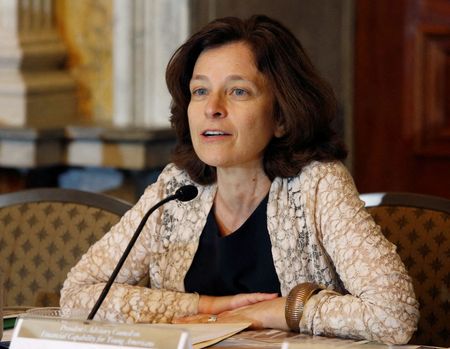
By Pete Schroeder
WASHINGTON (Reuters) -Sarah Bloom Raskin, President Joe Biden’s pick to lead the Federal Reserve’s regulatory work, told U.S. lawmakers on Thursday that she believes banks need strict oversight, but that it is not her job to tell them how and where to lend.
Raskin tried to make the case for her confirmation as the U.S. central bank’s next vice chair for supervision, a post that oversees its regulatory agenda, in a hearing before the Senate Banking Committee. She testified alongside Lisa Cook and Philip Jefferson, two of Biden’s nominees to become Fed governors.
Raskin, a former Fed governor and senior Treasury Department official during the Obama administration, will take on a sweeping agenda at the Fed if confirmed, with Democrats eager to reestablish tougher rules across the financial sector.
While progressives were pleased with Raskin’s nomination, she will also need to ensure the support of moderate Democrats in order to be confirmed by the narrowly divided Senate.
In her testimony, Raskin vowed to be an attentive, comprehensive bank watchdog, tracking everything from internal bank risks to cyberattacks.
“Bank supervisors must make sure that the safety of banks and the resilience of our financial system are never compromised in favor of short-term political agendas or special interest groups,” she said in her testimony. “They must stay attentive to risks no matter where they come from.”
Raskin also addressed a concern aired by some Republicans and business groups that she would take a hard line against oil and gas companies as the Fed builds out tools to assess financial risks stemming from climate change.
While Raskin has urged regulators to be vigilant on the financial risks associated with climate change, she was explicit in her testimony that it was not the Fed’s job to dictate bank lending. Rather, it should make sure banks were properly preparing for all risks.
“The role does not involve directing banks to make loans only to specific sectors, or to avoid making loans to particular sectors,” she said.
‘UNACCEPTABLE’ PICK
Senator Pat Toomey, the top Republican on the banking panel, has called Raskin an “unacceptable” pick, and said the Fed should not play a leading role in policing climate change.
“Unelected officials like Ms. Raskin want to misuse bank regulation to impose environmental policies that Congress has refused to enact,” he said.
The U.S. Chamber of Commerce, the nation’s top business lobby, took the rare step of raising concerns about her climate change stances in a letter sent to lawmakers ahead of the hearing.
Raskin’s backers are quick to point out the Harvard-trained lawyer’s lengthy experience on regulations, including stints at the Fed and Treasury in the wake of the 2007-2009 financial crisis and recession, as well as her time as the state of Maryland’s chief financial regulator.
And the Fed is already laying the groundwork to gauge the threat that climate change poses to the financial system, building out internal teams to assess that risk and also pressing banks for details on how they are mitigating climate change-related risks to their balance sheets.
Senator Sherrod Brown, the Democratic chairman of the Senate panel, said Raskin is the most qualified nominee he has ever seen for such a regulatory post, and noted she previously had been easily confirmed for senior roles at the Fed and Treasury. He said he expects she will be confirmed alongside Cook and Jefferson.
Brown previously said he would like the committee to advance the trio, along with the renomination of Fed Chair Jerome Powell and the elevation of Fed Governor Lael Brainard to the U.S. central bank’s vice chair position, on Feb. 15.
(Reporting by Pete Schroeder; Editing by Lincoln Feast and Paul Simao)

